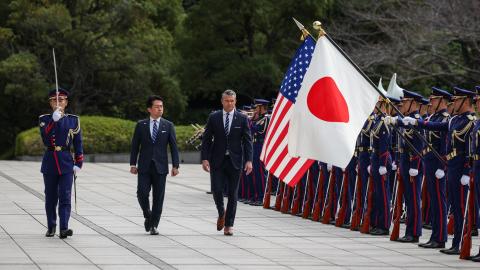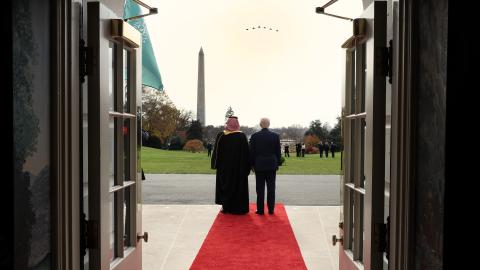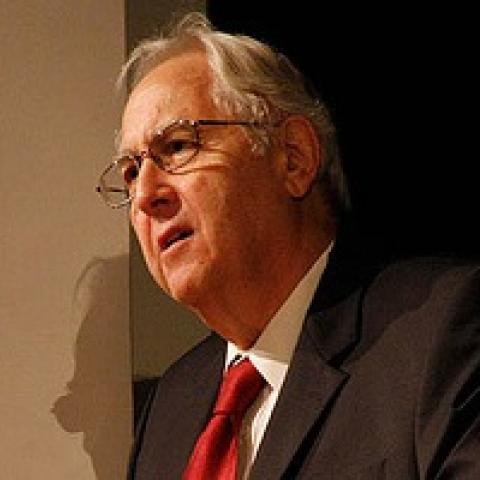A few years ago, I wrote on these pages about a forthcoming documentary series for Showtime, produced and directed by Oliver Stone and co-authored by American University left-wing historian Peter Kuznick. You can find what I wrote here and here I also took Stone on about this project in the pages of the Wall Street Journal, and you can also look at my op-ed
Now, in an interview appearing in the January issue of Rock Cellar Magazine, Stone announces that the 10 part series will air on the network this coming May, and in late April, the companion book written by Stone and Kuznick will be published by Gallery Books, the same publisher that ironically published Dick Cheney's memoir.
Now, Stone argues this history documentary will be a liberal progressive history of the U.S." Titled The Untold History of the United States, the information Stone offers us about it first shows how disingenuous the title is. Rather than never being told before — at least the title was changed from the first version that it would be the "unknown" history — it is a repeat of a very old and now stale leftist version of our past that dates not from the work of the late Howard Zinn, but from the old CPUSA "scholars" like the late Herbert Aptheker and the secret KGB agent and American Communist activist Carl Marzani, who in the early 1950s wrote a book titled "We Can Be Friends, the very first "Cold War revisionist" account that blamed the then-ongoing Cold War not on the aggressive policy of Joseph Stalin, but on American imperialism and the warlike anti-Soviet policy of the "fascist" president, Harry S. Truman.
Here is Stone's message, in his own words:
The Cold War itself. The whole concept we grew up with in school is that we have been aggressed by the Soviets since World War II; that they started the Cold War, and we responded. We deal with that very in depth, and it's important because it sets up the mindset that has infected America since then.
Stone continues to say that the U.S. thought "we had to respond to communism because it was seeking to dominate the world. I think that's a very important thing to overcome."
To Stone, the well-grounded view that John Gaddis spelled out so thoroughly in his 1998 book Now We Know: Rethinking Cold War History (which I reviewed here in which Gaddis wrote that "Once Stalin wound up at the top in Moscow, and once it was clear his state would survive the war, then it looks equally clear that there was going to be a Cold War whatever the West did," appears nowhere in Stone's repertoire of all those books he claims to have read for his series.
In fact, Gaddis wrote his book as a corrective not only to his own earlier thinking, but to all those who were mis-educated in precisely the kind of history Oliver Stone is again going to present to us. Most Americans who have gone to college from the 1960s on have learned precisely the kind of history Stone is presenting — the Cold War revisionist account that is only now beginning to be challenged by writers like Gaddis and the Notre Dame University historian, Wilson B. Miscamble.
Among other surprises in Stone's documentary, he reveals, is the portrayal of FDR's first Vice-President and then Secretary of Commerce Henry A. Wallace, whom he says emerges as one of the unsung, forgotten heroes of our history." Again, for decades, Wallace has not only not been forgotten, but has been continually resurrected by the American fellow-travelers of Communism as a hero. In 2000, we had John C. Culver and John Hyde's "American Dreamer: The Life and Times of Henry A. Wallace (which I reviewed for TNR), in 1973 the Communist historian Norman J. Markowitz's The Rise and Fall of the People's Century: Henry A. Wallace and American Liberalism, and in 1976 Richard J. Walton's Henry Wallace, Harry Truman and the Cold War, all of which argue precisely what Stone claims is going to be a new argument in his documentary. Most recently, we had the documentary about Pete Seeger shown on PBS, filmmaker Jim Brown's Pete Seeger: The Power of Song, which goes out of its way to treat Wallace as one of America's great unsung heroes.
As for the truth about Wallace, it is rather simple. Wallace bought the fiction hook, line and sinker that Stalin sought only peace, and that giving him what he wanted would assure a peaceful future and stave off the war Truman sought. He ran for president in 1948 on a third-party ticket, the Progressive Party, that was secretly formed and controlled by the CPUSA, and that was devoted first and foremost to trying to gain popular support for a pro-Soviet foreign policy, one based on appeasement of Stalin and that would support the Soviet Union's attempt to gain control not only of Eastern Europe, but of nations like France and Italy as well. I wrote the following in the article I cited at the beginning of this post, and it bears repetition:
Not only would there have been a Cold War, [if Henry Wallace had become president] but it would have put the United States on the same side as Joseph Stalin, and helped the Soviet dictator gain his goal of not only creating imitations of Moscow in the so-called "Peoples' Democracies" of Eastern Europe, but enabling him as well to subvert the established Western democracies existing in countries like Italy and France. With Wallace at the helm, the United States would have had a president advised by the remaining secret Communists in the government, such as Wallace's top advisor, the Soviet agent Harry Magdoff, who subsequently went on to edit the Marxist publication Monthly Review after his years in government came to an end. Having established already that he in fact supports the other side in Vietnam, it is perhaps not surprising that Kuznick [and Stone]also supports the Soviet side in the emerging Cold War in the 1950s.
Stone says he will show how much "Roosevelt and Stalin had in common," and that he reexamines "the emergence of the American empire." And of course, he argues that there would have been no Cold War had Wallace become president.
Stone's history is one, as he proudly says, that condemns Woodrow Wilson for the repression of radicals, especially the violent I.W.W., shows an America as a nation that tolerated the Ku Klux Klan in the 1920s, and the like. Now of course, all this is true, and again, is taught to most students. America had as a nation a long way to go to get to our present day and time, in which we have an African-American president and the old racist social structure in the Old South and the preeminence of the Klan have long passed into history. But what Stone obviously wants to paint is a portrait of a racist, backwards and imperialist country, one which could have been saved had it turned in earlier days to the likes of people like Henry Wallace.
Stone thinks "one of the worst things that ever happened to the U.S. is losing the Soviet Union as an equalizing balance and enemy…a countervailing force." Since its demise, Stone is sorry that we could not be held back, and hence, that the "military industrial complex" was able to continue "the concept that we have enemies that threaten us." (my emphasis)
Look at that phrase carefully: "Enemies that threaten us." I guess as Stone sees things, the United States has only imaginary enemies, not real ones like the jihadists, the Salafists, the Muslim Brotherhood, Al Qaeda, and, most of all, the Islamist theocracy of Iran. Instead he thinks it is all "paranoia..about terrorists,about Hussein…and they kept going."
And in case you wonder whom he supports for chief executive now that good old Henry Wallace is not with us — you guessed right — it's Ron Paul, whom he calls "the only one …who's saying anything intelligent about the future of the world." Stone asks: "Why is it necessary for every candidate- except for Ron Paul-to pay obeisance to this hypocrisy that the U.S. is a good force in the world?" To him, the US stands for "the right of empire, the right of force."
Surprise, surprise. Far Left and Far Right once again come together on behalf of the most extreme and anti-American candidate available.
Here is my suggestion. Write to CBS — the owner of Showtime — and ask them to spare us the attempt to provide a one-sided propagandistic history of the American past, one that will harm the understanding of a new generation and serve to promote a new hatred of our country. Ask them to cancel the series, and if you subscribe to the network, think about cancelling your subscription and tell them why you are doing this. To them it's all the bottom line. They got well deserve plaudits for the excellent Homeland, perhaps the best new series on television. To succeed, the network does not need Oliver Stone's history.
















